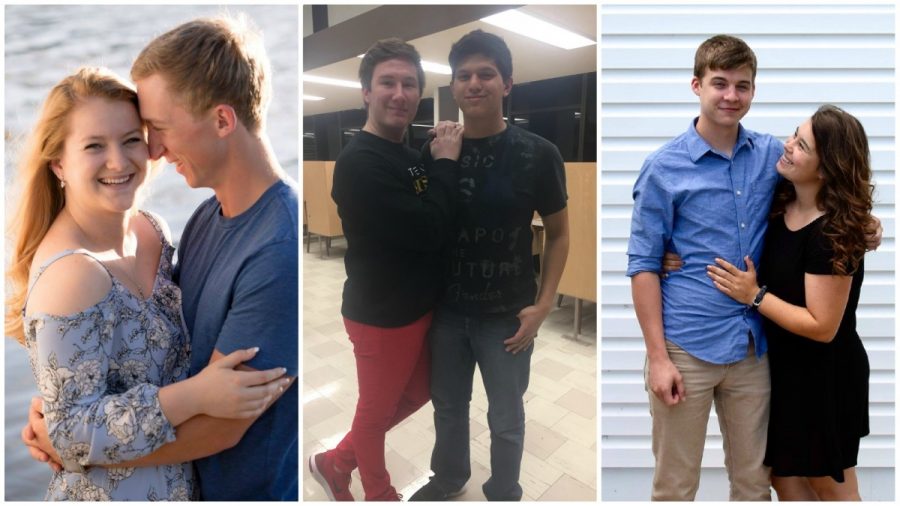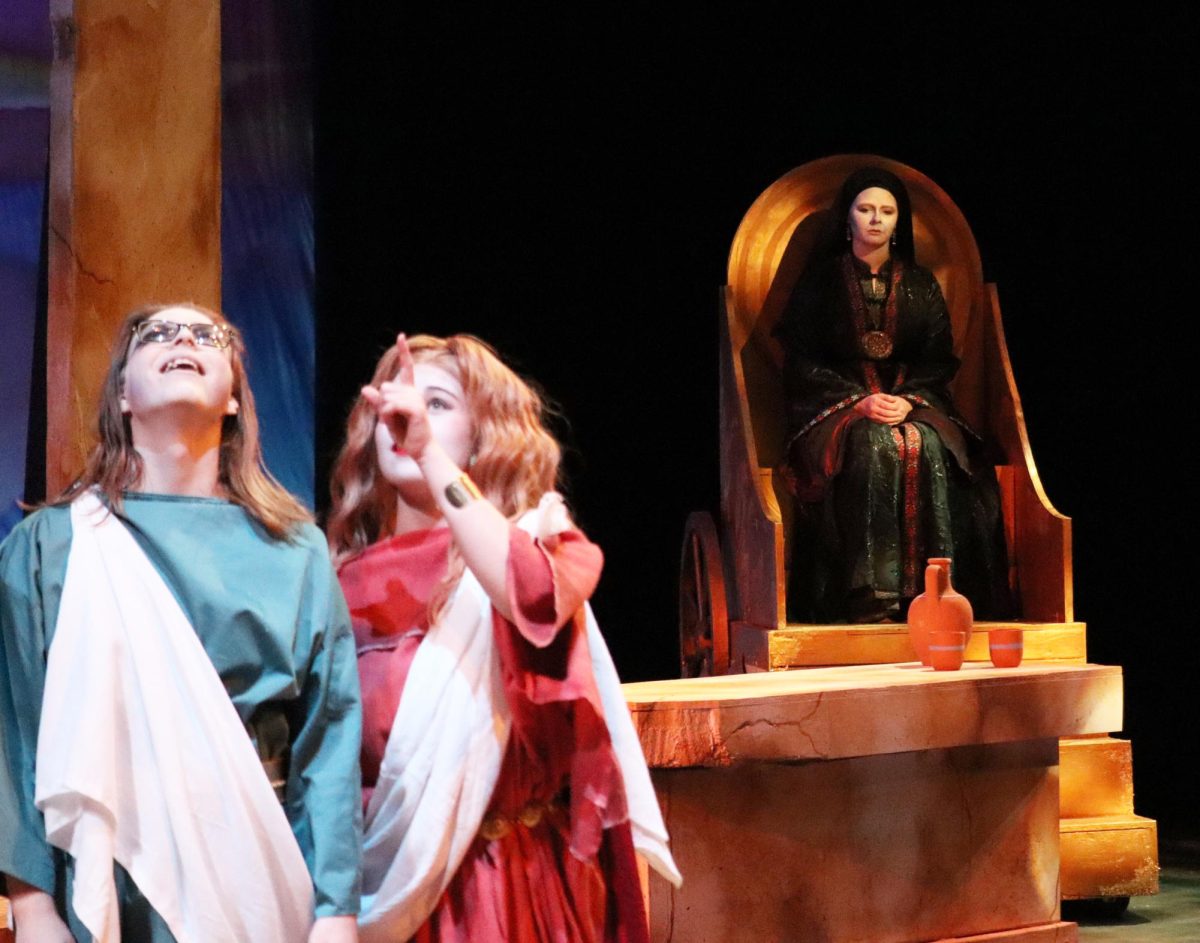Engaged student couples talk marriage prep, balancing student life
October 17, 2017
INDIANOLA, Iowa — To seniors MJ Wipperman, 21, and Jake Gibney, 21, some days are more stressful than others regarding their marriage preparations.
“For the most part, though, I don’t think it’s that stressful,” Gibney said. He and Wipperman have been engaged since April and plan on marrying in August 2018.
While most students come to Simpson to earn a degree and prepare for their careers, a handful of students end up meeting the person to whom they will say I do. These couples must balance college life alongside planning for marriage and all of the details involved in married life.
Wipperman said for her, being engaged in college is not different from dating, aside from “random wedding planning things.” However, she said her mom and sister were mostly taking care of the wedding details.
“We’re basically just dating — and I have more jewelry,” Wipperman added with a laugh.
Sophomore James McKee, 19, said being engaged to his fiancé actually makes him less stressed, calling their relationship, “a constant in my life.”
“I agree with that,” said his fiancé, James Simmons, 18. “It’s a constant in a lot of things, where college is constantly moving, and things are constantly changing.”
McKee and Simmons became engaged at the end of August, and since both plan on graduating from Simpson before marrying, they have not yet set a wedding date.
Before deciding on Simpson College, Simmons, a freshman, had considered attending college eight hours away. Had that been the case, both said they were prepared to adapt.
“We had discussed already how the constant would have worked, how we would have done things,” he said. Although both are on campus now, they actually see each other less often.
“It’s not because we’re not making time,” McKee said, “it’s just our schedules don’t overlap a lot. And then we have to do homework, and we have other things that we’re doing.”
“I don’t need to see him 24/7 to know that we’re in a relationship,” Simmons said. “It’s, ‘Hey, I love you. I have to go to class now, I’ll see you tomorrow.’”
For senior Maddy Hermon, 22, distance is a factor in her relationship with her fiancé, Ayden Twaddell. Since Twaddell, 21, lives in Kansas, Hermon said wedding planning can be a challenge.
“The biggest struggle is just not being face to face to be able to plan with him,” Hermon said. She later added, “The couples that are here (at Simpson) are able to plan together, face to face, and get everything situated together, whereas I sometimes feel like I’m on my own with it.”
Since Hermon is often busy with schoolwork during the week, she has made it a point to save wedding planning for the weekends. Despite sometimes feeling alone in the planning, she said her parents have been helping her with a lot of it.
She and Twaddell plan on marrying in July 2018, about a month after Twaddell will be finished with boot camp for the National Guard. “Once he gets back, it’s basically going to be really fast up until the wedding,” Hermon said.
While undergraduate school may at first seem like a common time for couples to tie the knot, getting married at this age is actually becoming less popular, statistically.
According to a 2011 study from the Pew Research Center, people in the U.S. on average first get married in their late 20s. Pew Research Center data also found that in the 1960s, most people got married in their early 20s. The data also showed that 72% of adults 18 and older were married in 1960, whereas only 51% were married in 2010.
Given recent statistical trends in marriage, the engaged couples at Simpson agreed there is a certain stigma surrounding marrying at a young age, but none said they personally have felt stigmatized or criticized for their decision.
“I think overall there’s a huge stigma to it because we’re not in the 1970s or 1980s anymore, when it was a little more accepted then,” said Simmons. “Now, everyone is living longer so they’re like, ‘It’s OK to go until you’re 30 before you start actually, seriously dating.’”
On the other hand, Hermon said a lot of her friends, who were still only seniors in high school, got engaged or married this past summer. “There’s a point for me where I feel like I’m too old to be getting married,” she said.
Before even becoming engaged, the Simpson couples all said they had known their relationships would eventually lead to marriage.
McKee and Simmons have been engaged for only three weeks, yet have been living together for over eight months. “We’ve had a lot of time to think about this and mull this over,” Simmons said.
Wipperman and Gibney had also known they would end up staying together. “We started planning what we were going to do when we were married — before we were even engaged,” said Gibney.
Since Hermon and Twaddell have known each other since they were little kids, Hermon said once they started dating, it was only a matter of time before they began talking about marriage.
Though none of the couples intend to marry at Simpson, the campus chaplain, Mara Bailey, offers free premarital counseling to engaged couples or those considering marriage. Most of the counseling Bailey does is in response to couples asking her to officiate their weddings.
“If I’m going to officiate someone’s wedding, I require that they do premarital counseling, either with me or someone else,” she said. “My hope is that they do it with me because it’s a good way for me to get to know them as we work toward their wedding day and personalizing their wedding message.”
Bailey uses a counseling course called Prepare and Enrich, which she said is not the same thing as a compatibility quiz. “It’s more of a survey to take a look at your background, your family history, the things that are important to you coming into marriage.”
This process allows Bailey to take a look at where the couples are coming from and where their goals are in line. It also lets her know things they need to talk about, so she can give them tools to communicate well in their marriage.
“All of our sessions beyond that are just spent addressing particular things, usually starting with communication and good communication skills and why communication is the foundation of a good marriage,” said Bailey.
All three couples said they were either going to receive premarital counseling from another source or were at least open to the idea.
Bailey’s parting advice to any couple considering marriage was to get counseling, “whether or not it’s a requirement of the person who might be officiating your wedding.”
Even to those who are not engaged, Bailey said meeting with a counselor can be helpful in gauging relationships and seeing if marriage is a good idea.
“I think that everybody who is entering into that kind of relationship needs to spend time — they owe it to each other and they owe it to themselves — to spend that time connecting in that way and having those hard conversations,” she said. “And having those conversations with someone who can guide you through it is incredibly beneficial.”







